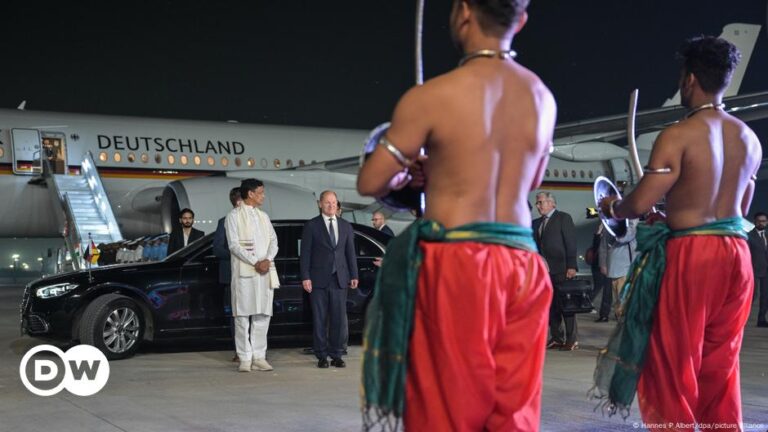German Chancellor Olaf Scholz and Indian Prime Minister Narendra Modi are set to co-chair the 7th edition of Intergovernmental Consultations (IGC) between India and Germany on Friday.
Scholz met Modi on Friday morning at the Indian Prime Minister’s official residence.
The German leader arrived in New Delhi on Thursday just before midnight with several senior ministers of his cabinet for the high-level talks — a framework established by the two countries in 2011.
He was received by India’s Minister of State for Home Affairs, Nityanand Rai.
“Herzlich willkommen in Neu Delhi! (Welcome to New Delhi),” the spokesperson for the Indian Ministry of External Affairs, Randhir Jaiswal, wrote in German on social media platform X as he shared pictures of the Chancellor’s ceremonial welcome.
This is Scholz’s third visit to India since he became Chancellor in 2021.
In 2023, he visited India twice — for a bilateral state visit in February and to attend the G20 Leaders’ Summit later in September.
What are the Intergovernmental Consultations?
The IGC — which spans over two days — will see ministers from both sides holding discussions in their respective areas. They will then report the outcome of their talks with Scholz and Modi.
The dialogue also comes at a crucial juncture for both Berlin and New Delhi as Germany looks to court India as a key strategic partner.
Last week, Germany adopted the “Focus on India” paper, indicating that it wants to deepen its relationship with India.
Experts in India say that the consultations are significant in the light of how ties between India and Germany have transformed in the last few years.
“We have seen a dramatic strategic convergence and changes within Germany, about Germany wanting to play a larger role in the Indo-Pacific and wanting to have more forward looking partnerships with countries like India,” Harsh V. Pant, Vice President – Studies and Foreign Policy, at the New Delhi-based Observer Research Foundation told DW.
“That has made a lot of difference to the texture of the relationship which used to be primarily focused on economics but now it has become more strategic. These consultations are important in terms of the direction that they would provide for the future of this relationship,” he added.
Ramping up ties on the economy, climate and security and tapping into India’s young talent are expected to rank high on the docket for the talks.
What is the schedule?
On Friday, Scholz and Modi inaugurated the 18th Asia Pacific Conference of German Business (APK) in New Delhi as the key conference coincides with the consultations.
“Our overall message is clear: we need more cooperation not less,” Scholz said at the conference.
German Vice Chancellor and Economy Minister Robert Habeck is co-chairing the APK.
After the talks, Scholz is slated to travel to the western Indian state of Goa where the German naval frigate “Baden-Württemberg” and combat support ship “Frankfurt am Main” will make a pre-scheduled port call as part of Germany’s Indo-Pacific deployment, the Indian foreign ministry said in a statement earlier this week.
“The visit of a German frigate to India as well as to Japan, Korea and South East Asian countries underlines our commitment to open seas and international law,” Scholz said on Friday.
“At our intergovernmental consultations with India we also want to deepen our cooperation on defense and agree to bring our militaries closer together,” he added.
Germany’s ThyssenKrupp Marine Systems is vying for a mammoth six-submarine deal with the Indian Navy but Spanish company Navantia is also a competitor.
Edited by: Wesley Dockery


